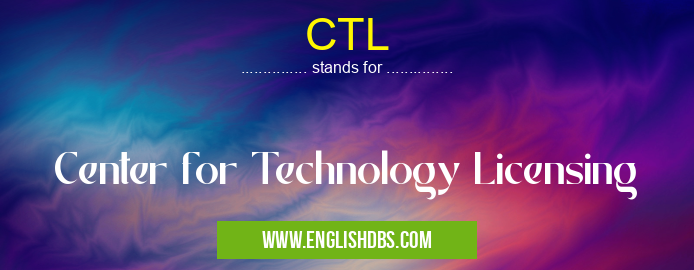What does CTL mean in TECHNOLOGY
CTL stands for Center for Technology Licensing. This is a department at Cornell University located in Ithaca, New York. The CTL was established in 1979 and provides guidance, resources, and support to faculty, staff and students on the process of transferring innovations from the laboratory to the marketplace. In addition to their licensing activities, they also serve as a resource for information about patents, copyrights and other forms of intellectual property (IP). CTL is dedicated to facilitating collaborations between innovators and industry partners by providing expertise in technology transfer and IP management.

CTL meaning in Technology in Computing
CTL mostly used in an acronym Technology in Category Computing that means Center for Technology Licensing
Shorthand: CTL,
Full Form: Center for Technology Licensing
For more information of "Center for Technology Licensing", see the section below.
» Computing » Technology
Essential Questions and Answers on Center for Technology Licensing in "COMPUTING»TECHNOLOGY"
What is the Center for Technology Licensing (CTL)?
The Center for Technology Licensing (CTL) is a research and technology transfer unit at Cornell University. CTL promotes internal collaborations between faculty, staff and students in order to facilitate the commercialization of Cornell discoveries. As such, CTL negotiates licenses to patents or federally owned inventions from Cornell University with external partners, assigns licenses to startup companies formed on campus, and provides advice to inventors on intellectual property protection.
How does CTL promote internal collaborations?
CTL encourages collaboration between Cornell faculty, staff and students by providing resources to develop joint innovation projects. Through its networks and partnerships with external organizations, CTL facilitates sharing of ideas through sponsored events such as hackathons or innovation workshops. Additionally, CTL also serves as a platform for sharing information about patenting process, invention disclosure procedures and potential commercialization opportunities.
What type of licensing activities does CTL provide?
CTL provides several licensing activities including negotiating licenses with commercial entities who wish to use Cornell-owned intellectual property; assigning licenses to startups formed by current members of the university; advising inventors on patenting matters; monitoring licensees’ compliance with license agreement terms; collecting royalty payments; and transferring funds generated from licensing activities back to the University.
Who can I contact if I have questions about Intellectual Property (IP)?
If you have any questions or would like more information about IP or licensing activities provided by CTL please contact our office at [email protected] or 607-254-4500. Also you may also visit us online at www.ctl.cornell.edu/contact-us for more information on how we can help you with your IP needs.
How can I start working on a new idea that I have?
If you are interested in starting work on a new idea then please contact the Innovation Management team at [email protected] who can help advise you on how best to protect your IP before entering into any discussions about how it could be developed into a product or service ready for market entry. They will also guide you through the process of filing any necessary patent applications.
How do I file my invention disclosure when using CTL services?
You must complete an Invention Disclosure Form (IDF), which should be submitted electronically through eDisclose system found here https://edisclose.cornell.edu/. Upon submission of your IDF form an Innovation Manager will review it and contact you if there are any questions that require clarification before continuing with further action.
Does CTL offer assistance in exploring potential markets for my invention?
Yes, once an invention disclosure has been filed with the appropriate department then the Innovation Management team assesses the feasibility of commercializing your idea based off existing market evidence in order to identify potential customers or investors who may be interested in taking it forward towards production or sale.
How long does it typically take for an invention to become licensed?
Processing time depends highly on factors such as complexity of concept, whether proper evaluations were conducted prior to initiation of negotiations etc., so there is no one size fits all answer when it comes to timeline estimates for becoming commercially successful via licensing agreements established by CTL.
Final Words:
In summary, CTL stands for Center for Technology Licensing at Cornell University in Ithaca New York. It promotes exchange of ideas between campus inventors and industry partners to facilitate collaboration on product development or research projects involving patented IP assets. Through this program innovators can benefit from expert guidance on designing business plans or preparing patent applications while industries can gain access to cutting-edge technology from some of the brightest minds in higher education today. By furthering knowledge sharing between these two groups it not only boosts local economies but also brings novel solutions that can benefit humanity at large.
CTL also stands for: |
|
| All stands for CTL |
